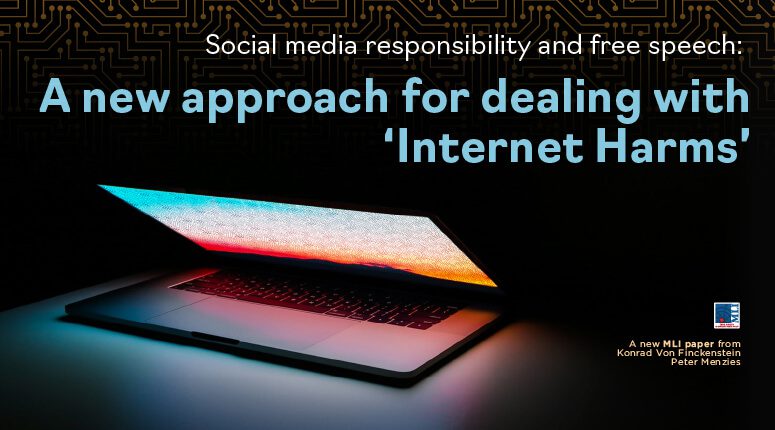Konrad von Finckenstein and Peter Menzies – a former chair and vice-chair of the CRTC, respectively – propose a new approach for addressing online harms without undermining free speech.
OTTAWA, ON (February 16, 2022): With the emergence of the Internet, and social media in particular, has come previously unimaginable levels of free expression. At the same time, there are increasing concerns that largely unfettered freedom is creating harms for individuals and a society forced to contend with disinformation, unrestrained hate speech, and other challenges.
Is there a way to protect free expression online while confronting these harms? A new MLI paper, authored by a former CRTC chair and a former vice-chair, propose a first draft of legislation to accomplish this very goal.
In “Social media responsibility and free speech: A new approach for dealing with ‘Internet Harms’,” Konrad von Finckenstein and Peter Menzies examine the issues at play in Canada, revealing that the government’s approach to date misses the mark.
The authors suggest that the previous Parliament’s “online harms” proposal was far too heavy-handed, empowering unelected regulators to determine what kinds of speech online is acceptable. As they write, “any efforts aimed at regulating the Internet should stay as far away as possible from attempting to manage what people have to say about the events of the day.”
“To do otherwise only leads, at best, to endless haggling within an unnecessary legal quagmire and, therefore, inefficiency. At worst, such efforts lead to government suppression of freedom.”
Instead, Finckenstein and Menzies note that the only bodies with the ability and legitimacy to combat online harms are social media companies themselves. What is needed is legislation that establishes a regime of responsibility for social media companies.
The authors propose the development of the Social Media Responsibility Act. The legislation would clarify that users on platforms are responsible for their own speech, but it would also compel social media companies to develop and impartially implement a code of conduct on its users.
To read the full paper, click the button below.
***
Peter Menzies is a Senior Fellow with the Macdonald-Laurier Institute and spent close to 10 years as a member of the Canadian Radio-television and Telecommunications Commission including terms as a part-time Commissioner, regional Commissioner for Alberta and the Northwest Territories and as vice-chair of Telecommunications. Konrad W. von Finckenstein is a Senior Fellow at the C.D. Howe Institute, focusing mainly on communications law, dispute resolution, competition law, and mergers and acquisitions. Von Finckenstein served as Chair of the Canadian Radio-television and Telecommunications Commission (CRTC) from 2007 to 2012.
For more information, media are invited to contact:
Brett Byers
Communications and Digital Media Manager
613-482-8327 x105
brett.byers@macdonaldlaurier.ca







